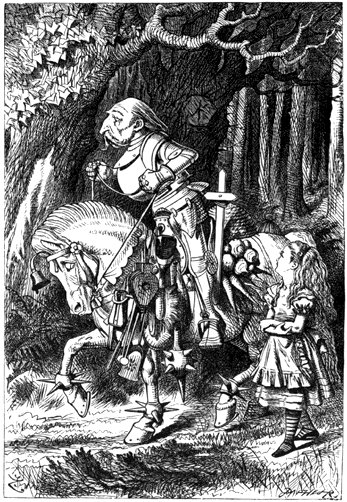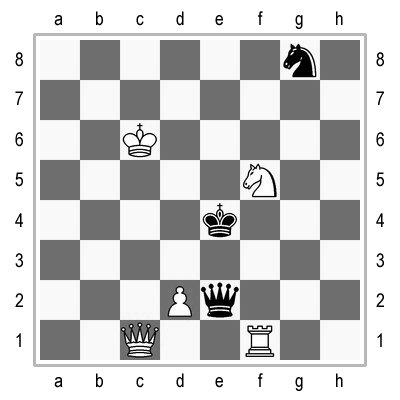
LETERATUR
Testos orijinal ·
Cantas traduida ·
Dramas traduida ·
Naras traduida ·
Poesias traduida ·
Sitas traduida ·
Testos diversa ·
Divertis
Tra la miror, e cua Alisia trova a ultra, comun cortida a Tra la miror o Alisia tra la miror, es un novela famosa per enfantes, scriveda par Lewis Carroll e seguente pos Alisia en la pais de mervelias.
Esta tradui es par Simon Davies en 2013 e 2014.

(organizada como ante la comensa de la jua)
DRAMATIS PERSONÆ
(As arranged before commencement of game)
| PESOS BLANCA Rococon Unicorno Ovea Rea Blanca Re Blanca Om Vea Cavalo Blanca Rococin | PEONES BLANCA Margarita Lale-Pre Ostra “Lil” Serveta Ostra Laxa-Por Margarita | PEONES ROJA Margarita Mesajor Ostra Lil tigrin Rosa Ostra Rana Margarita | PESOS ROJA Ovaluna Carpentor Morsa Rea Roja Re Roja Corvo Cavalo Roja Leon |
| WHITE PIECES Tweedledee Unicorn Sheep White Queen White King Aged Man White Knight Tweedledum | WHITE PAWNS Daisy Haigha Oyster “Lily” Fawn Oyster Hatta Daisy | RED PAWNS Daisy Messenger Oyster Tiger-lily Rose Oyster Frog Daisy | RED PIECES Humpty Dumpty Carpenter Walrus Red Queen Red King Crow Red Knight Lion |

Ta ce la peon blanca (Alisia) move prima, e gania pos des-un turnos.
White Pawn (Alice) to play, and win in eleven moves.
1a. Alisia encontra Rea Roja
1b. Rea Roja a h5
2a. Alisia traversa d3 (par ferovia) a d4 (Rococin e Rococon)
2b. Rea Blanca a c4 (pos xal)
3a. Alisia encontra Rea Blanca (con xal)
3b. Rea Blanca a c5 (deveni ovea)
4a. Alisia a d5 (boteca, rio, boteca)
4b. Rea Blanca a f8 (lasa ovo sur scafal)
5a. Alisia a d6 (Ovaluna)
5b. Rea Blanca a c8 (fuji de Cavalo Roja)
6a. Alisia a d7 (foresta)
6b. Cavalo Roja a e7 (xace)
7a. Cavalo Blanca prende Cavalo Roja
7b. Cavalo Blanca a f5
8a. Alisia a d8 (coroni)
8b. Rea Roja a e8 (esamina)
9a. Alisia deveni Rea
9b. Reas roca
10a. Alisia roca (banceta)
10b. Rea Blanca a a6 (sopa)
11a. Alisia prende la Rea Roja e gania
1a. Alice meets Red Queen
1b. Red Queen to King’s Rook’s 4th
2a. Alice through Queen’s 3rd (by railway) to Queen’s 4th (Tweedledum and Tweedledee)
2b. White Queen to Queen’s Bishop’s 4th (after shawl)
3a. Alice meets White Queen (with shawl)
3b. White Queen to Queen’s Bishop’s 5th (becomes sheep)
4a. Alice to Queen’s 5th (shop, river, shop)
4b. White Queen to King’s Bishop’s 8th (leaves egg on shelf)
5a. Alice to Queen’s 6th (Humpty Dumpty)
5b. White Queen to Queen’s Bishop’s 8th (flying from Red Knight)
6a. Alice to Queen’s 7th (forest)
6b. Red Knight to King’s 2nd (check)
7a. White Knight takes Red Knight
7b. White Knight to King’s Bishop’s 5th
8a. Alice to Queen’s 8th (coronation)
8b. Red Queen to King’s square (examination)
9a. Alice becomes Queen
9b. Queens castle
10a. Alice castles (feast)
10b. White Queen to Queen’s Rook’s 6th (soup)
11a. Alice takes Red Queen and wins
PREFACE
Car la problem de xace donada a supra ia confonde alga de mea lejores, cisa lo ta es bon si me esplica ce lo es coreta scemada, cuanto conserna la moves. La alterna de roja e blanca es cisa no tan sever realida como posible, e la roca de la tre Reas es mera un modo de dise ce los entra a la palasio: ma cualcun va trova ce la xace de la Re Blanca a move 6, la prende de la Cavalo Roja a move 7, e la xacemata final de la Re Roja segue esata la regulas de la jua, si el ta disturba se per posa la pesos e fa la moves como dirijeda.
As the chess-problem given on the previous page has puzzled some of my readers, it may be well to explain that it is correctly worked out, so far as the moves are concerned. The alternation of Red and White is perhaps not so strictly observed as it might be, and the “castling” of the three Queens is merely a way of saying that they entered the palace: but the “check” of the White King at move 6, the capture of the Red Knight at move 7, and the final “checkmate” of the Red King, will be found, by any one who will take the trouble to set the pieces and play the moves as directed, to be strictly in accordance with the laws of the game.
The new words in the poem “Jabberwocky” have given rise to some differences of opinion as to their pronunciation: so it may be well to give instructions on that point also. Pronoune “slithy” as if it were the two words “sly the”: make the ‘g’ hard in “gyre” and “gimble”: and pronounce “rath” to rhyme with “bath”.
¤ ¤ ¤
Enfant’ de fas contente, con
Tua oios merveliante!
An si la tempo freta tal
Ce nos es tan distante,
Tu surie en salut’ amable
A esta don’ amin de fable.
Child of the pure unclouded brow
And dreaming eyes of wonder!
Though time be fleet, and I and thou
Are half a life asunder,
Thy loving smile will surely hail
The love-gift of a fairy-tale.
Me vide no tua fas de sol,
Tua ries de arjento:
Tu no va pensa sur mea rol,
A pos de est’ momento—
Lo va sufisi ja probable
Ce tu escut’ joven mea fable.
I have not seen thy sunny face,
Nor heard thy silver laughter:
No thought of me shall find a place
In thy young life’s hereafter—
Enough that now thou wilt not fail
To listen to my fairy-tale.
En otra dias lo comens’
Su sol d’ estate cara—
La ritmo de nosa remi es
Gidada par un nara—
La ecos resta memorida,
Ma invios’ nos dis’ “oblida”.
A tale begun in other days,
When summer suns were glowing—
A simple chime, that served to time
The rhythm of our rowing—
Whose echoes live in memory yet,
Though envious years would say “forget.”
Escuta per pospone ce
Tu oia la insiste
De los ci clama a sua let’
Un xica alga triste!
An nos, enfantes vea, formi
Un frustra cuando nos va dormi.
Come, harken then, ere voice of dread,
With bitter tidings laden,
Shall summon to unwelcome bed
A melancholy maiden!
We are but older children, dear,
Who fret to find our bedtime near.
Esterna: jelo, neva, vent’,
Tempest’ en mal ruido—
Interna: focos roj’ ardent’,
Felisias de nido.
La majia va abrasa bon tu;
Tu no va oia la soflon ru.
Without, the frost, the blinding snow,
The storm-wind’s moody madness—
Within, the firelight’s ruddy glow,
And childhood’s nest of gladness.
The magic words shall hold thee fast:
Thou shalt not heed the raving blast.
Si ombras suspirante fa
Ce on anela “dias
Felis d’ estate” ja pasad’
En joia par la fias—
Los no va cambia odiable
La lisia dulse de nosa fable.
And, though the shadow of a sigh
May tremble through the story,
For “happy summer days” gone by,
And vanish’d summer glory—
It shall not touch, with breath of bale,
The pleasance of our fairy-tale.
Esta paje es presentada con la lisensa CC Attribution-Share Alike 4.0 International.
Lo ia es automata jenerada de la paje corespondente en la Vici de Elefen a 9 desembre 2025 (09:51 UTC).